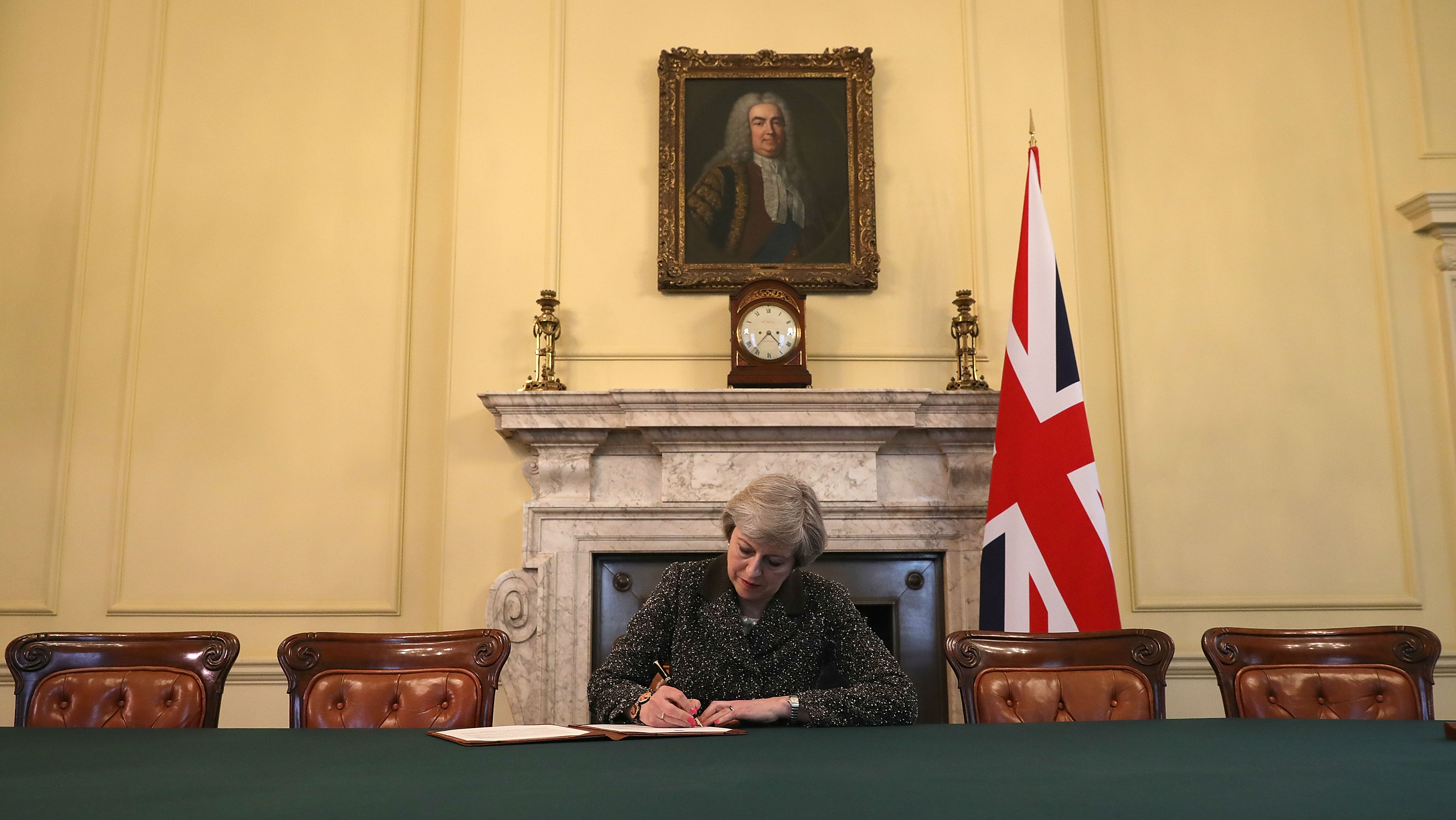Article 50: The world reacts to Brexit
Foreign press give Theresa May's letter to Donald Tusk and the EU a gloomy reception

A free daily email with the biggest news stories of the day – and the best features from TheWeek.com
You are now subscribed
Your newsletter sign-up was successful
This week saw Theresa May present European Council President Donald Tusk with a six-page "divorce" letter triggering Article 50 and officially beginning the Brexit countdown – a move greeted overwhelmingly with disappointment and frustration from the world's press.
According to left-wing French daily Liberation, May's letter, with its repeated insistence on a "deep and special relationship", was "more conciliatory" than her previous bullish rhetoric
However, it adds, a Eurosceptic press and hardcore Brexiters means the UK is "caught up in a fantasy of a return to the glory of a colonial Empire" and "one cannot hide the fear" that they will try to scupper negotiations.
The Week
Escape your echo chamber. Get the facts behind the news, plus analysis from multiple perspectives.

Sign up for The Week's Free Newsletters
From our morning news briefing to a weekly Good News Newsletter, get the best of The Week delivered directly to your inbox.
From our morning news briefing to a weekly Good News Newsletter, get the best of The Week delivered directly to your inbox.
History will decide whether voting for Brexit was "foolishness" or "a bold act", says German daily newspaper Die Welt.
It mourns the end of the "strategic logic" it says brought European nations together while weighing up the impact for the bloc, saying that while Europe has coped with other crises, none has been as serious as Brexit.
Centre-right French daily Le Monde says May's phrasing was "almost sickly", but that at its heart was "utterly blatant blackmail".
In the US, the New Yorker struggled to accept the letter, which was "filled with so many false claims, so much cant, and so many examples of wishful thinking that it is hard to know where to begin".
A free daily email with the biggest news stories of the day – and the best features from TheWeek.com
The Prime Minister's vow to represent "every person" in the UK was "blatantly false" when the young, the college-educated, and the outward-looking all rejected, and still reject, Brexit", claimed the magazine.
"Many of them regard it as a willful act of self-destruction, and future historians will surely agree with them."
The New York Times says that Britain, "a nation famous for calmly carrying on", has done so – although for all the reassurance that those recession warnings over leaving the EU have not proved correct, "nothing has actually happened yet".
Adriana Cerretelli, in Italian business daily Il Sole 24 Ore, writes that Brexit "reflects the British obsession with regaining national sovereignty and defending its own insular identity on every level".
The EU and its "undeniable flaws" must certainly accept a portion of the blame for its unpopularity in the UK, she says, but at the heart of the referendum result was a "confused desire" to undo the choice made more than 40 years ago.
Confusion was also the watchword for Belgian daily Le Soir, which asked: "How will the UK be 'stronger' facing the world's powers alone? Or 'fairer' abandoning a slew of rights and the values which guarantee them?"
Once no longer part of the EU family, the UK will "worry about these questions alone", it says, adding: "From now on, it is 'us' and 'them'."
-
 5 cinematic cartoons about Bezos betting big on 'Melania'
5 cinematic cartoons about Bezos betting big on 'Melania'Cartoons Artists take on a girlboss, a fetching newspaper, and more
-
 The fall of the generals: China’s military purge
The fall of the generals: China’s military purgeIn the Spotlight Xi Jinping’s extraordinary removal of senior general proves that no-one is safe from anti-corruption drive that has investigated millions
-
 Why the Gorton and Denton by-election is a ‘Frankenstein’s monster’
Why the Gorton and Denton by-election is a ‘Frankenstein’s monster’Talking Point Reform and the Greens have the Labour seat in their sights, but the constituency’s complex demographics make messaging tricky
-
 Epstein files topple law CEO, roil UK government
Epstein files topple law CEO, roil UK governmentSpeed Read Peter Mandelson, Britain’s former ambassador to the US, is caught up in the scandal
-
 Iran and US prepare to meet after skirmishes
Iran and US prepare to meet after skirmishesSpeed Read The incident comes amid heightened tensions in the Middle East
-
 Israel retrieves final hostage’s body from Gaza
Israel retrieves final hostage’s body from GazaSpeed Read The 24-year-old police officer was killed during the initial Hamas attack
-
 China’s Xi targets top general in growing purge
China’s Xi targets top general in growing purgeSpeed Read Zhang Youxia is being investigated over ‘grave violations’ of the law
-
 Panama and Canada are negotiating over a crucial copper mine
Panama and Canada are negotiating over a crucial copper mineIn the Spotlight Panama is set to make a final decision on the mine this summer
-
 Why Greenland’s natural resources are nearly impossible to mine
Why Greenland’s natural resources are nearly impossible to mineThe Explainer The country’s natural landscape makes the task extremely difficult
-
 Iran cuts internet as protests escalate
Iran cuts internet as protests escalateSpeed Reada Government buildings across the country have been set on fire
-
 US nabs ‘shadow’ tanker claimed by Russia
US nabs ‘shadow’ tanker claimed by RussiaSpeed Read The ship was one of two vessels seized by the US military